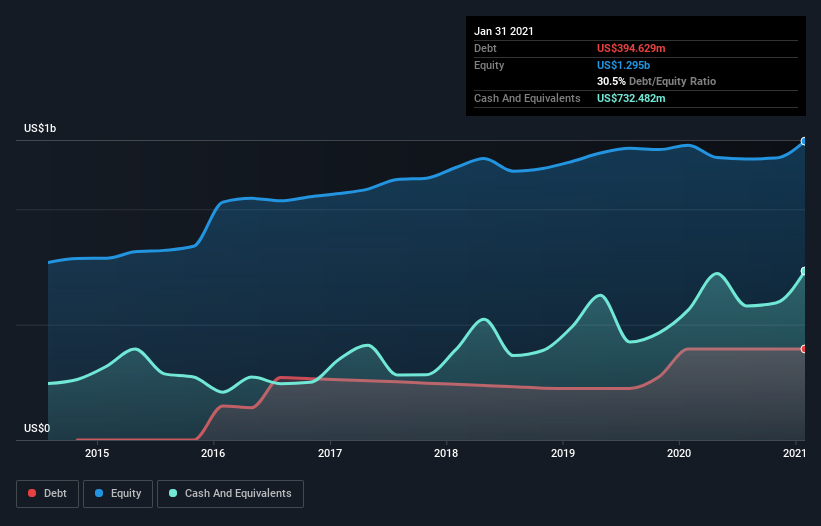These 4 Measures Indicate That Korn Ferry (NYSE:KFY) Is Using Debt Reasonably Well
David Iben put it well when he said, 'Volatility is not a risk we care about. What we care about is avoiding the permanent loss of capital.' So it seems the smart money knows that debt - which is usually involved in bankruptcies - is a very important factor, when you assess how risky a company is. We note that Korn Ferry (NYSE:KFY) does have debt on its balance sheet. But should shareholders be worried about its use of debt?
When Is Debt A Problem?
Debt assists a business until the business has trouble paying it off, either with new capital or with free cash flow. In the worst case scenario, a company can go bankrupt if it cannot pay its creditors. However, a more common (but still painful) scenario is that it has to raise new equity capital at a low price, thus permanently diluting shareholders. Of course, the upside of debt is that it often represents cheap capital, especially when it replaces dilution in a company with the ability to reinvest at high rates of return. When we examine debt levels, we first consider both cash and debt levels, together.
View our latest analysis for Korn Ferry
What Is Korn Ferry's Net Debt?
As you can see below, Korn Ferry had US$394.6m of debt, at January 2021, which is about the same as the year before. You can click the chart for greater detail. But it also has US$732.5m in cash to offset that, meaning it has US$337.9m net cash.
How Strong Is Korn Ferry's Balance Sheet?
According to the last reported balance sheet, Korn Ferry had liabilities of US$635.4m due within 12 months, and liabilities of US$933.1m due beyond 12 months. Offsetting these obligations, it had cash of US$732.5m as well as receivables valued at US$493.1m due within 12 months. So its liabilities total US$342.9m more than the combination of its cash and short-term receivables.
Of course, Korn Ferry has a market capitalization of US$3.63b, so these liabilities are probably manageable. However, we do think it is worth keeping an eye on its balance sheet strength, as it may change over time. While it does have liabilities worth noting, Korn Ferry also has more cash than debt, so we're pretty confident it can manage its debt safely.
It is just as well that Korn Ferry's load is not too heavy, because its EBIT was down 33% over the last year. When a company sees its earnings tank, it can sometimes find its relationships with its lenders turn sour. There's no doubt that we learn most about debt from the balance sheet. But ultimately the future profitability of the business will decide if Korn Ferry can strengthen its balance sheet over time. So if you want to see what the professionals think, you might find this free report on analyst profit forecasts to be interesting.
Finally, a company can only pay off debt with cold hard cash, not accounting profits. Korn Ferry may have net cash on the balance sheet, but it is still interesting to look at how well the business converts its earnings before interest and tax (EBIT) to free cash flow, because that will influence both its need for, and its capacity to manage debt. Over the last three years, Korn Ferry recorded free cash flow worth a fulsome 93% of its EBIT, which is stronger than we'd usually expect. That positions it well to pay down debt if desirable to do so.
Summing up
While it is always sensible to look at a company's total liabilities, it is very reassuring that Korn Ferry has US$337.9m in net cash. The cherry on top was that in converted 93% of that EBIT to free cash flow, bringing in US$203m. So we are not troubled with Korn Ferry's debt use. The balance sheet is clearly the area to focus on when you are analysing debt. However, not all investment risk resides within the balance sheet - far from it. For example, we've discovered 3 warning signs for Korn Ferry that you should be aware of before investing here.
If, after all that, you're more interested in a fast growing company with a rock-solid balance sheet, then check out our list of net cash growth stocks without delay.
This article by Simply Wall St is general in nature. It does not constitute a recommendation to buy or sell any stock, and does not take account of your objectives, or your financial situation. We aim to bring you long-term focused analysis driven by fundamental data. Note that our analysis may not factor in the latest price-sensitive company announcements or qualitative material. Simply Wall St has no position in any stocks mentioned.
Have feedback on this article? Concerned about the content? Get in touch with us directly. Alternatively, email editorial-team (at) simplywallst.com.

